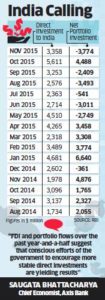 The quality of foreign investment coming into the country has improved substantially, according to Reserve Bank of India data.
The quality of foreign investment coming into the country has improved substantially, according to Reserve Bank of India data.
Much of this is foreign direct investment (FDI) materialised in the September 2014-November 2015 period after Prime Minister Narendra Modi launched the Make in India campaign and bettered portfolio inflows during the period.
Gross FDI inflows amounted to $62.6 billion, 31% higher than $47.6 billion in the preceding 15 months.
 This is more than triple the amount of net portfolio inflows of $14.3 billion in the same period. An analysis of the monthly trend in foreign investment inflows shows that in most months stable long-term FDI has been more than portfolio inflows, which have been more volatile in the period.
This is more than triple the amount of net portfolio inflows of $14.3 billion in the same period. An analysis of the monthly trend in foreign investment inflows shows that in most months stable long-term FDI has been more than portfolio inflows, which have been more volatile in the period.
Economists say the surge in FDI is largely due to several initiatives by the government to attract investment in the manufacturing sector. “FDI and portfolio flows over the past year-and-a-half suggest that conscious efforts of the government to encourage more stable direct investments are yielding results,” said Saugata Bhattacharya, chief economist at Axis Bank. “At a time when global capital markets have become volatile, FDI flows reduce uncertainty about foreign capital outflows and, consequently, currency volatility.”
The surge in FDI in India is significant given that investment across the world has fallen by 16%, said Amitabh Kant, secretary at the Department of Industrial Policy and Promotion, at a recent event.
Though a sizeable amount is estimated to have gone to the manufacturing sector, including consumer goods and food processing, among others, a section of the market feels that a portion of the FDI inflows could have come through the private equity route.
This seldom finds its way into greenfield projects but at the same time provide an important source of finance for entrepreneurs.
“A significant part of the higher FDI has come in as PE and VC funding, which helps finance entrepreneurs,” said Bhattacharya.
Prime Minister Modi’s Make in India initiative is aimed at turning the country into a global manufacturing hub to generate jobs, raise incomes and drive growth.
The government has been seeking to drum up investment as part of this effort. India’s growth is being driven by public spending and consumption with private investment yet to kick in substantially.
Source: http://economictimes.indiatimes.com/articleshow/50764021.cms



